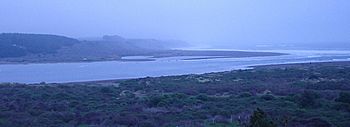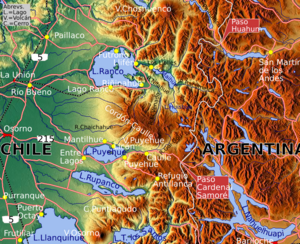Nilahue River facts for kids
Quick facts for kids Nilahue River |
|
|---|---|

View of Nilahue River near its mouth in Ranco Lake
|
|
| Country | Chile |
| Physical characteristics | |
| Main source | Cordón Caulle |
| River mouth | Ranco Lake 70 m (230 ft) |
| Length | more than 40 km (25 mi) |
The Nilahue River is a river found in the Andes mountains of south-central Chile. It flows through the Lago Ranco area.
The Nilahue River begins at the Cordón Caulle volcano. It then flows into Ranco Lake, which is a large lake in Chile. The Nilahue River is the second biggest river that flows into Ranco Lake. The Calcurrupe River is the largest.
The River's Journey
The Nilahue River gets its water from two main sources. It collects water from rainfall. It also gets water from melting snow high up in the Cordón Caulle mountains.
You can find the Los Baños hot springs on one of the smaller streams that feed into the Nilahue River. The river flows for more than 40 kilometers (about 25 miles).
Upper and Lower Parts
The upper part of the river flows for about 20 kilometers (12 miles). It runs from the Cordón Caulle area towards a place called Carrán maar. A maar is a wide, flat-bottomed volcanic crater.
In this section, the Nilahue River flows along one side of a valley. Another river, called Contrafuerte River, flows along the other side. They join together near Cerro La Overa.
The northern, lower part of the river also flows for about 20 kilometers. This section goes from the Carrán maar all the way to Ranco Lake. Along this part of the river, you can see the beautiful Salto del Nilahue waterfall.
Volcanic Ash and the River
In 2011, there was a big volcanic eruption from Puyehue volcano. Ash from this eruption fell into the Nilahue River. This ash caused a lot of problems for the river and its wildlife.
The ash made the river dirty and sadly killed many fish. On June 10, 2011, the area around the Nilahue River had to be evacuated. This happened because the river overflowed its banks. It was blocked by the volcanic ash and other debris.
The temperature of the river also went up a lot. It rose by about 113 degrees Fahrenheit (45 degrees Celsius). It's estimated that more than 4.5 million fish died because of these changes.
See also
 In Spanish: Río Nilahue para niños
In Spanish: Río Nilahue para niños
 | James B. Knighten |
 | Azellia White |
 | Willa Brown |


